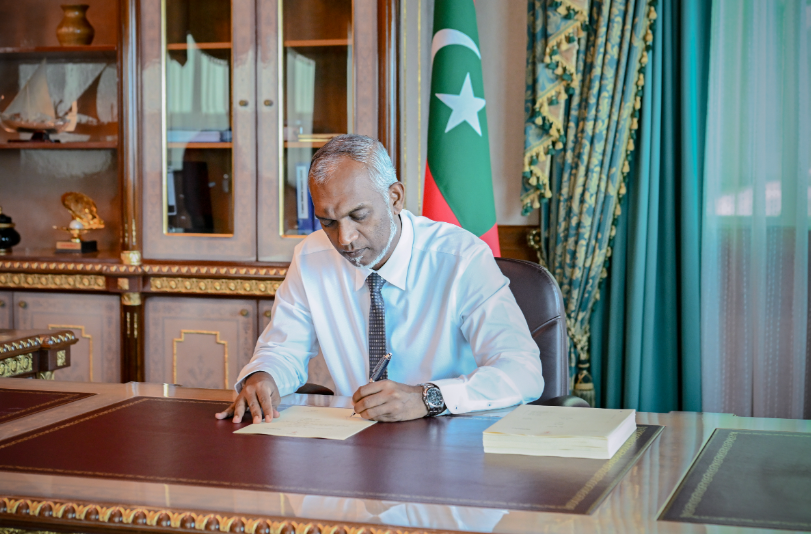Questions raised as gov’t implements three policies touted as benefiting all Maldivians
The measures include a lifetime tobacco ban for citizens born on or after 1 January 2007, permission for regulated Gulper shark fishing, and civil service salary increases


President Dr. Mohamed Muizzu ratifying a bill
The government has announced the implementation of three new policies, which President Dr. Mohamed Muizzu claims will benefit all Maldivian citizens. The initiatives, a generational tobacco ban, the reintroduction of Gulper shark fishing under a management plan, as well as salary adjustments across the civil service, came into effect on 1 November 2025.
According to the government, the measures include a lifetime ban on tobacco use for all citizens born on or after 1 January 2007; permission for regulated Gulper shark fishing; and the harmonization and increase of salaries for civil servants, including council and judiciary staff.
While the administration has presented these policies as major national achievements, public response has been mixed, with growing criticism over their practicality, fairness, and long-term consequences.
Concerns over tobacco ban enforcement
Although many Maldivians support the goal of creating a tobacco-free generation, critics argue that the policy may be impossible to enforce effectively. Weak regulatory enforcement has long plagued the country, with existing smoking restrictions in public areas already widely ignored. Reports have also surfaced of a growing illegal tobacco market since the generational ban was announced, raising questions about whether the government has the capacity or mechanisms to prevent smuggling and black-market trade.
Salary adjustments amid rising costs
The government claims to have harmonized and increased the salaries of civil service and judiciary employees, but many workers say that their pay remains inadequate in light of soaring living costs and a steadily rising dollar rate. Economists warn that such salary adjustments could further fuel inflation, driving up the prices of goods and services.
The government’s revised state pay framework has also attracted criticism. Under the new regulations, overtime allowances are to be paid only after eight hours of work, excluding time spent on personal matters during official hours, a change seen by some as a move that effectively reduces take-home pay for many employees.
Environmental and economic risks in shark fishing policy
Perhaps the most contentious of the three policies is the decision to lift the national ban on Gulper shark fishing. The Maldives had prohibited all forms of shark fishing in 2010, establishing itself as a global shark sanctuary. Despite a recent national survey showing strong public opposition to reopening the fishery, the government has approved a management plan allowing it to resume.
Environmental groups have expressed deep concern, warning that the move could damage the country’s marine ecosystems and harm its global reputation for sustainable tourism. Experts have also cautioned that reversing the sanctuary status may have long-term economic repercussions, particularly for the dive tourism sector, which relies heavily on the presence of sharks.
Growing public skepticism
While the government has framed these three initiatives as forward-looking measures for national development, growing skepticism among citizens, experts and environmental advocates suggests otherwise. Many argue that the policies reflect poor planning, weak enforcement capacity and misplaced priorities at a time when public confidence in economic management and environmental stewardship is already under strain.






